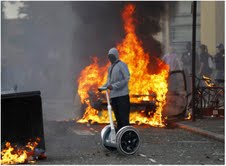Posted by Vale
But, I hear you say, we do already. All the time. Interminably.
And, of course, we do.
This website springs from the Good Funeral Guide and the blog is full of discussions about new ways to dispose of bodies, about wild and wonderful flights of imagination in the services that are being created and lots of talk about the funeral industry itself. There is even room for philosophising in the many posts that consider what funerals are for (click on the category Ceremonies at the bottom of this post for a full listing).
But it struck me recently that, interesting and important as this talk is, most of our posts are about what happens in and after the service. We talk much more rarely about what happens before, even though this is where, for the people involved, all the important decisions are taken. It is also where funeral directors have an opportunity to make a real difference to the quality of the service provided. To understand how, you first have to recognise what is happening.
Think about the traditional way that funerals were commissioned (and allow me to exaggerate and oversimplify for a moment). In a religious context it is the priest/ rabbi/ immam or whoever that acts as the guardian of the process. They may well be involved before death. After they act both as guardian and guide to what is to be done, in what timescale and with what rites. Funeral director, the family themselves, every player in the funeral process submits to this approach.
For the people involved in – and who are happy to identify themselves with – the process there is a great deal of comfort in this. It is often rooted in community. It will express contains both tradition and continuity, and it satisfies the requirements of faith. There is the added satisfaction of knowing that all that is right and proper has been done.
Of course the direct link between family and faith – even as a cultural association) has been weakening for a long time now. In this census year a UK survey by the British Humanist Association suggested that two thirds of us do not regard ourselves as religious. While, internationally, another study claimed that data collected over a number of censuses (censi?) showed that in nine countries there was a trend that would lead in the end to the extinction of religion.
In these circumstances what should families do? The GFG is unequivocal. People should be given the information, advice, time and support they need to work out what sort of funeral service they want.
But, without access to another wise guide, funeral directors have, by default, acquired a huge new responsibility. More often than not they are the ones that families turn to as they begin to face up to the question of what sort of service it is that they need to commission. It has to be a real concern that – with some notable, brilliant and inspiring exceptions – too many still feel that the old process is the best – even where it lacks all legitimacy or meaning in the lives of the people affected.
This is why we need to talk about funerals. Meaning, spirituality, grieving, the comfort of community are all possible outside of religion, but only if the right questions are asked at the start. What needs to happen to make sure that more funeral directors are willing to ask them?


